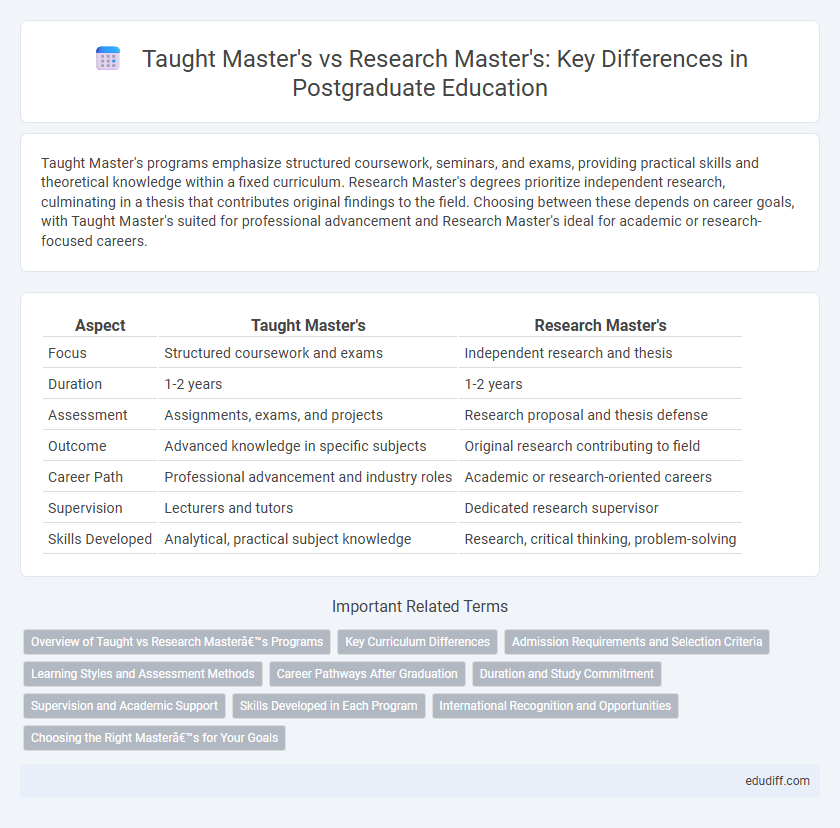Taught Master's programs emphasize structured coursework, seminars, and exams, providing practical skills and theoretical knowledge within a fixed curriculum. Research Master's degrees prioritize independent research, culminating in a thesis that contributes original findings to the field. Choosing between these depends on career goals, with Taught Master's suited for professional advancement and Research Master's ideal for academic or research-focused careers.
Table of Comparison
| Aspect | Taught Master's | Research Master's |
|---|---|---|
| Focus | Structured coursework and exams | Independent research and thesis |
| Duration | 1-2 years | 1-2 years |
| Assessment | Assignments, exams, and projects | Research proposal and thesis defense |
| Outcome | Advanced knowledge in specific subjects | Original research contributing to field |
| Career Path | Professional advancement and industry roles | Academic or research-oriented careers |
| Supervision | Lecturers and tutors | Dedicated research supervisor |
| Skills Developed | Analytical, practical subject knowledge | Research, critical thinking, problem-solving |
Overview of Taught vs Research Master’s Programs
Taught Master's programs prioritize structured coursework, seminars, and examinations to develop advanced knowledge and practical skills in a specific discipline, often with a shorter duration of one to two years. Research Master's programs emphasize independent research, culminating in a thesis or dissertation, and are ideal for students aiming to pursue doctoral studies or careers requiring strong analytical and investigative abilities. The choice between these programs depends on career goals, learning preferences, and the level of research engagement desired.
Key Curriculum Differences
Taught Master's programs emphasize structured coursework, including lectures, seminars, and regular assessments designed to provide comprehensive knowledge in a specific subject area. Research Master's programs prioritize independent research projects, culminating in a substantial thesis that contributes original findings to the academic field. The curriculum of a Taught Master's typically includes core modules and electives, while a Research Master's focuses on research methodology training and close supervision by academic advisors.
Admission Requirements and Selection Criteria
Taught Master's programs typically require a relevant undergraduate degree with a minimum GPA as the primary admission criterion, often supplemented by academic transcripts, personal statements, and references. Research Master's admissions emphasize prior research experience, a detailed proposal, and alignment with faculty expertise, alongside academic qualifications. Selection for Research Master's prioritizes research potential and supervisor availability, whereas Taught Master's focus on academic achievement and course suitability.
Learning Styles and Assessment Methods
Taught Master's programs typically emphasize structured learning with lectures, seminars, and coursework assessments such as exams and essays, favoring students who excel in guided study and standardized evaluation. Research Master's degrees focus on independent investigation, critical analysis, and producing a thesis, catering to learners who prefer self-directed study and formative, feedback-driven assessment. Understanding these differing learning styles and assessment methods is crucial for prospective postgraduate students to align their strengths and career goals with the appropriate master's pathway.
Career Pathways After Graduation
Taught Master's programs emphasize structured coursework and practical skills, aligning graduates with professional roles in industries such as business, education, or engineering, facilitating immediate entry into the workforce. Research Master's degrees prioritize independent study and original research, preparing graduates for doctoral studies or careers in academia, research institutions, and specialized sectors requiring advanced analytical expertise. Employers in sectors like pharmaceuticals, technology, and policy often prefer candidates with research Master's experience for roles involving innovation and complex problem-solving.
Duration and Study Commitment
Taught Master's programs typically last one year full-time, featuring structured coursework and scheduled assessments ideal for those preferring a clear timeline and consistent study commitments. Research Master's degrees usually extend to two years, emphasizing independent research and thesis writing, requiring self-motivation and longer-term dedication. The choice depends on whether students prioritize shorter duration with guided learning or an in-depth research focus with flexible time demands.
Supervision and Academic Support
Taught Master's programs provide structured supervision through scheduled lectures and regular tutorials, ensuring consistent academic support from course instructors and facilitators. Research Master's degrees emphasize individualized supervision, where students work closely with a dedicated academic supervisor to develop independent research skills. Both models offer tailored academic guidance, but research-oriented master's prioritize mentorship in scholarly inquiry and original contribution to the field.
Skills Developed in Each Program
Taught Master's programs emphasize practical skills such as project management, critical analysis, and discipline-specific techniques through structured coursework and assessments. Research Master's programs develop advanced research skills, including data collection, hypothesis formulation, and scholarly writing, fostering independent inquiry and problem-solving. Both pathways enhance critical thinking and subject mastery, preparing graduates for professional roles or doctoral studies.
International Recognition and Opportunities
Taught Master's programs emphasize structured coursework and practical skills, making them internationally recognized for professional advancement and global employability. Research Master's degrees focus on original research, fostering academic expertise and enhancing opportunities for PhD admission and scholarly collaboration worldwide. Both pathways offer distinct advantages, with taught Master's favoring industry readiness and research Master's boosting academic credentials and international research networks.
Choosing the Right Master’s for Your Goals
Taught Master's programs emphasize structured coursework and practical skills, ideal for those seeking professional development or career advancement in specific fields. Research Master's degrees focus on original investigation and thesis work, suited for students aiming at academic careers or doctoral study. Selecting the right Master's depends on your career objectives, preferred learning style, and long-term goals within academia or industry.
Taught Master’s vs Research Master’s Infographic

 edudiff.com
edudiff.com